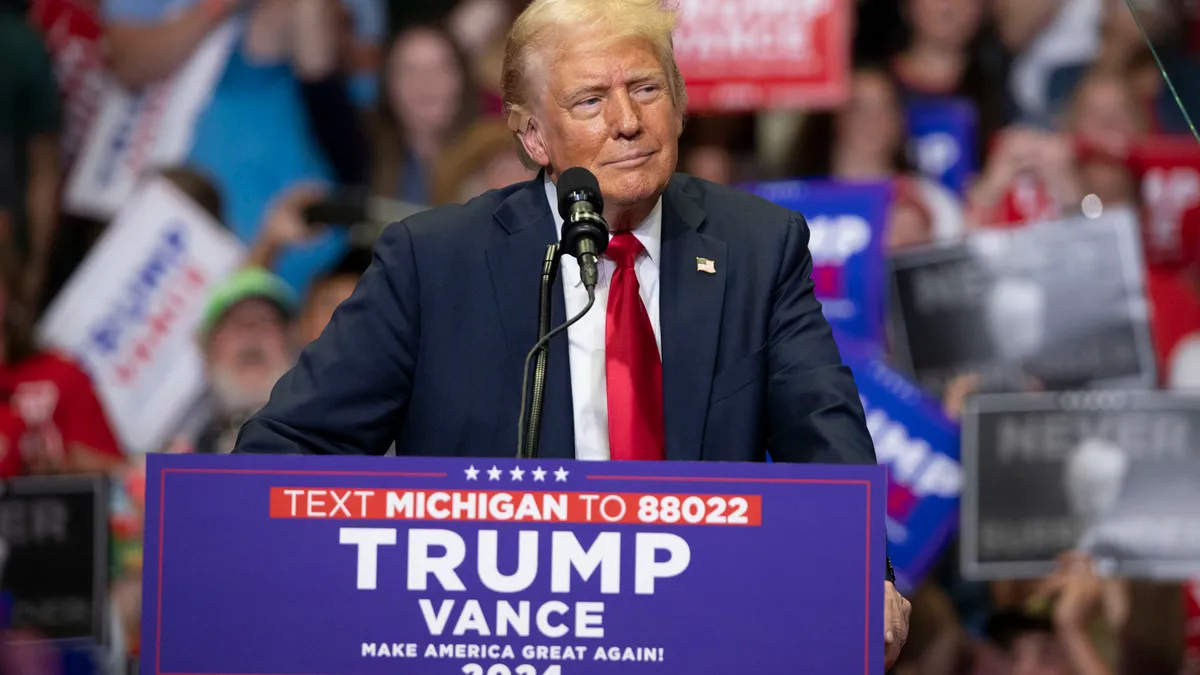Former President Donald Trump’s proposed 10% credit card interest rate cap could fundamentally change the way credit card services are offered in the unlikely event that it were to pass.
High interest rates are meant to cover risk and pay for the perks credit card users have come to expect, and capping annual interest would likely mean that credit card issuers would offer cards to fewer risky customers and eliminate some fringe benefits, according to analysts and attorneys who follow the industry.
“If the interest rate is too low for credit card borrowing, less suppliers would come to the market to supply credits,” said Lin William Cong, an associate professor of finance at Cornell’s SC Johnson College of Business, who is also the academic director of the school’s Fintech at Cornell Initiative.
Sen. Bernie Sanders of Vermont and Democratic Rep. Alexandria Ocasio-Cortez of New York introduced a bill in 2019 that included an interest rate cap, according to Politico.
“We’re going to cap [interest rates] at around 10%,” Trump said during a rally on Sept. 18, calling it a “temporary” fix while Americans “catch up.” “We can’t let them make 25 and 30 percent,” he added, referring to credit card issuers. That 10% figure is lower than the 15% Sanders and Ocasio-Cortez proposed.
To be clear, Trump’s interest rate cap as a legislative proposal is almost certainly dead on arrival in a deeply divided Washington.
“We still see this as a low probability event as it would require an act of Congress,” Jaret Seiberg, managing director at TD Cowen’s Washington Research Group, wrote in a Sept. 19 note to investors.
Regulators lack the power to unilaterally cap interest rates, and conservative judges would likely overturn any attempt to do so by federal agencies such as the Consumer Financial Protection Bureau, he wrote.
“We might as well be talking about Russia invading Alaska, because that’s how likely this is,” said Chris Willis, co-leader of the consumer financial services regulatory practice group for law firm Troutman Pepper.
Even with the odds stacked against the proposal, Trump’s interest rate cap engendered some strong reactions.
The American Bankers Association said in a statement that it had opposed Sanders and Ocasio-Cortez’s interest rate cap, and signaled it would oppose this one.
An interest rate cap would “result in the loss of credit for the very consumers who need it the most,” a ABA spokesperson said in an email. “Instead, these consumers would be forced to use less-regulated, more risky alternatives including payday lenders and loan sharks.”
Even the Wall Street Journal’s usually pro-Trump editorial page staked out a position opposed to the former president’s idea, echoing some of the ABA’s comments.
“Why do Messrs. Trump and Sanders think it’s helpful to limit credit access and send folks to the pawn broker or leg breaker instead?” the Journal’s editorial page wrote on Sept. 22.
If there were to be a cap that becomes law, it would immediately change the way credit card networks assess risk, Willis said.
“Those interest rates are there to compensate for the risk of non-payment,” he said. “The credit card is one of the easiest forms of credit to use. You can go to almost any merchant, [and] there’s no collateral, and the consequences of non-payment are a lot less [than other forms of credit], so credit card issuers are not used to enjoying a lot of priority in terms of repayment if someone is having difficulty paying bills.”
Consumers with questionable credit histories have to pay higher rates, Willis noted.
The average interest rate for a U.S. credit card holder is 15.6%, according to a J.D. Power survey released last month.
If those rates were to be capped at 10%, banks would be less likely to take on consumers with lower credit ratings and “anyone with risk of non-payment is not going to get a card,” he said. Those customers are more likely to come from low-income households, Willis said.
If Congress forced interest rates lower, credit card issuers would look for ways to make up the lost revenue, Cong said. For example, the fees merchants pay to process credit card payments could rise, he said.
“Merchants would exit the market by not accepting credit cards any more,” Cong said.
Credit cards in the United States sometimes come with perks. American Express, for example, offers access to reservations at exclusive restaurants. An interest rate cap threatens advantages like that, said John Cabell, director of wealth and lending intelligence for the data analytics firm J.D. Power.
“Part of what funds that is annual fees and service charges, but part of that is also interest charges,” he said. “To some degree, people paying interest and having revolving debt are funding the rewards for everyone else. That makes it more difficult for issuers to continue to offer the kind of rewards escalation that we've already seen.”


















